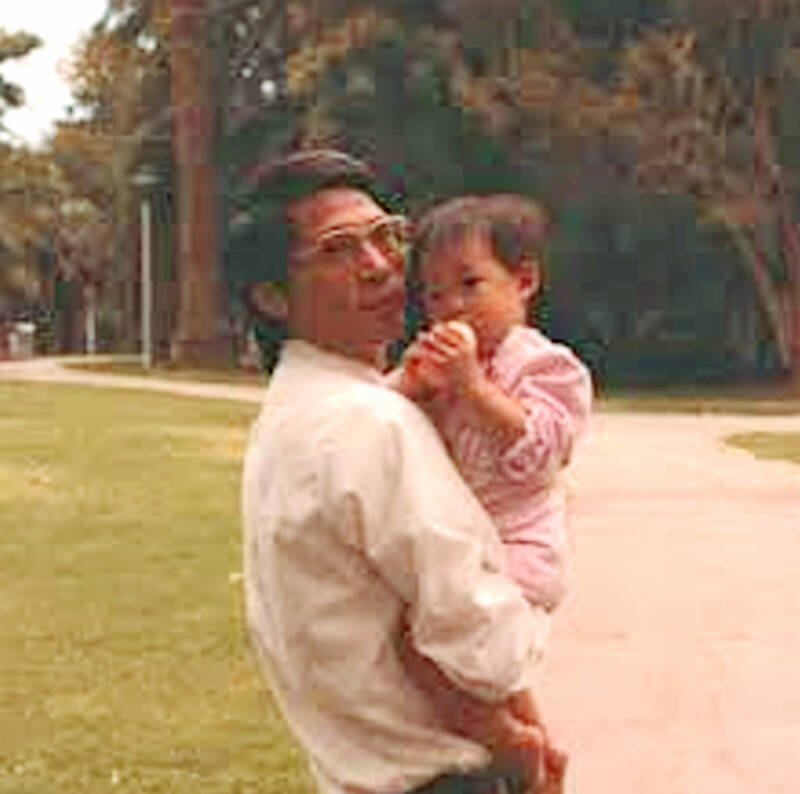China has released a US pastor after nearly two decades in prison, presenting an olive branch to the US that had repeatedly called for his release.
US citizen David Lin (林大衛) was freed from a prison in China, a US Department of States spokesman said.
The 68-year-old born-again Christian had been held in China since 2006 on allegations of fraud, although critics said his sermons and involvement in building a home church were frowned upon by Beijing, which tries to control religious activity.

Photo: grab from Bring Our Families Home Campaign FB/ Alice Lin
“He has returned to the United States and now gets to see his family for the first time in nearly 20 years,” the State Department said in a statement to Bloomberg News yesterday.
His unexpected release from jail suggests Beijing is making a show of goodwill at a critical time for US-China relations, especially with the US presidential election in November. While there is progress on issues such as tackling fentanyl trafficking and resuming high-level military talks, tensions persist over Taiwan and technology-sharing.
The Chinese Ministry of Foreign Affairs did not respond to a request for comment.
Lin, together with Mark Swidan, a Texas businessman on death row for alleged drug trafficking, and Li Kai (李凱), a naturalized US citizen who imported solar energy technology, have been on the state department’s priority list of US nationals who have been arbitrarily detained.?
Lin, who was set to be released in December 2029, was freed just days before a US Congress hearing scheduled tomorrow over securing the freedom of unjustly detained Americans in China.
The Dui Hua Foundation, which campaigns for political prisoners in China, said it welcomed Lin’s release from the Beijing Number Two Prison.
“It represents one of the most important releases of a religious prisoner since [Chinese President] Xi Jinping [習近平]came to power in 2012,” John Kamm, chairman of the Dui Hua Foundation, told Bloomberg News. “It demonstrates a willingness to improve relations with the United States by releasing its citizens from prison.”

Swedish campaigner Greta Thunberg was deported from Israel yesterday, the Israeli Ministry of Foreign Affairs said, the day after the Israeli navy prevented her and a group of fellow pro-Palestinian activists from sailing to Gaza. Thunberg, 22, was put on a flight to France, the ministry said, adding that she would travel on to Sweden from there. Three other people who had been aboard the charity vessel also agreed to immediate repatriation. Eight other crew members are contesting their deportation order, Israeli rights group Adalah, which advised them, said in a statement. They are being held at a detention center ahead of a

A Chinese scientist was arrested while arriving in the US at Detroit airport, the second case in days involving the alleged smuggling of biological material, authorities said on Monday. The scientist is accused of shipping biological material months ago to staff at a laboratory at the University of Michigan. The FBI, in a court filing, described it as material related to certain worms and requires a government permit. “The guidelines for importing biological materials into the US for research purposes are stringent, but clear, and actions like this undermine the legitimate work of other visiting scholars,” said John Nowak, who leads field

‘THE RED LINE’: Colombian President Gustavo Petro promised a thorough probe into the attack on the senator, who had announced his presidential bid in March Colombian Senator Miguel Uribe Turbay, a possible candidate in the country’s presidential election next year, was shot and wounded at a campaign rally in Bogota on Saturday, authorities said. His conservative Democratic Center party released a statement calling it “an unacceptable act of violence.” The attack took place in a park in the Fontibon neighborhood when armed assailants shot him from behind, said the right-wing Democratic Center, which was the party of former Colombian president Alvaro Uribe. The men are not related. Images circulating on social media showed Uribe Turbay, 39, covered in blood being held by several people. The Santa Fe Foundation

NUCLEAR WARNING: Elites are carelessly fomenting fear and tensions between nuclear powers, perhaps because they have access to shelters, Tulsi Gabbard said After a trip to Hiroshima, US Director of National Intelligence Tulsi Gabbard on Tuesday warned that “warmongers” were pushing the world to the brink of nuclear war. Gabbard did not specify her concerns. Gabbard posted on social media a video of grisly footage from the world’s first nuclear attack and of her staring reflectively at the Hiroshima Peace Memorial. On Aug. 6, 1945, the US obliterated Hiroshima, killing 140,000 people in the explosion and by the end of the year from the uranium bomb’s effects. Three days later, a US plane dropped a plutonium bomb on Nagasaki, leaving abut 74,000 people dead by the